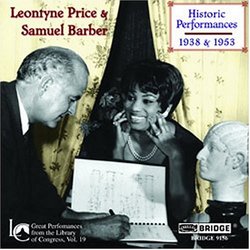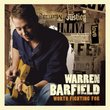| All Artists: Samuel Barber, Francis Poulenc, Henri Sauguet, Gabriel Faure, English Traditional, American Traditional, Italian Traditional, Robert Schumann, Felix [1] Mendelssohn, Carl Philipp Emanuel Bach, Johannes Brahms, Franz [Vienna] Schubert, Leontyne Price Title: Leontyne Price & Samuel Barber: Historic Performances, 1938 & 1953 Members Wishing: 0 Total Copies: 0 Label: Bridge Release Date: 10/5/2004 Genres: Folk, Pop, Classical Styles: Easy Listening, Vocal Pop, Opera & Classical Vocal, Historical Periods, Classical (c.1770-1830), Modern, 20th, & 21st Century Number of Discs: 1 SwapaCD Credits: 1 UPC: 090404915628 |
Search - Samuel Barber, Francis Poulenc, Henri Sauguet :: Leontyne Price & Samuel Barber: Historic Performances, 1938 & 1953
 | Samuel Barber, Francis Poulenc, Henri Sauguet Leontyne Price & Samuel Barber: Historic Performances, 1938 & 1953 Genres: Folk, Pop, Classical
The 1953 recording features the spectacular twenty-six year old Leontyne Price, accompanied by Samuel Barber at the Library of Congress. The duo's entire recital is issued whole for the first time. In this recital the sop... more » |
Larger Image |
CD DetailsSynopsis
Album Description The 1953 recording features the spectacular twenty-six year old Leontyne Price, accompanied by Samuel Barber at the Library of Congress. The duo's entire recital is issued whole for the first time. In this recital the soprano and composer give the world premiere performance of Barber's "Hermit Songs", and perform Henri Sauguet's "La Voyante" (The Fortune Teller) and other songs by Barber, Poulenc and Fauré. This remarkable 1938 recording, released to the public for the first time, gives us the 28 year old baritone, Samuel Barber in 12 songs, accompanying himself at the piano. These little known performances reveal Barber as a singer/player of uncommonly deep communicative power. The performances (issued in cooperation with Mr. Barber's estate and the Curtis Institute in Philadelphia) include folk songs from England, America, the Tyrol and Tuscany as well as lieder by Schumann, Brahms, Mendelssohn, C.P.E Bach and Schubert. Similarly Requested CDs
|
CD ReviewsHistoric Barber and Price Performances Lynn in Dallas | Dallas, TX USA | 07/08/2008 (4 out of 5 stars) "For devotees of either Leontyne Price or Samuel Barber, this CD is a cherishable piece of musical history--actually, two cherishable pieces. On one CD, the listener shares in two historic live performances. The better known is the October 30, 1953, recital at the Library of Congress, at which the 26-year-old Leontyne Price began her long musical alliance with Samuel Barber by singing the world premiere of his "Hermit Songs". Also included in the recital were four other songs by Barber, as well as eleven French songs by Poulenc, Sauguet, and Faure--25 songs in all. Barber was the accompanist for the entire recital, playing superbly.
Barber and Price recorded "Hermit Songs" in the studio a year later, and Price also did studio recordings of four of the Poulenc songs in 1959 on "A Program of Song" with her usual accompanist, David Garvey. It is interesting to compare the live and studio versions of the Barber and of the Poulenc, all of which are currently available on CD. The live ones seem more filled with the need to reach out to the audience, and Price's voice, in projecting to the audience, seems a bit darker and more dramatic, even though Price was younger at the time. There is more adrenalin flowing. The studio recordings are more "inner", more reflective, more subtle, more floating. Also, the superior sound technology of the studio more completely captures the unique quality of Price's voice in its prime, and that ultimately leads me to prefer the studio versions to the ones on this CD. Nevertheless, there is drama in these live performances that I would not be without. For instance, Price and Barber make Poulenc's "Tu vois le feu du soir" richer and more compelling here, and Barber's urgency at the keyboard on this piece makes Garvey seem tame. The most esoteric part of this CD is the other live performance. In addition to being a gifted composer and pianist, Samuel Barber was a rather good baritone in his youth, and the last twelve songs (folksongs from England, Kentucky, the Tyrol, and Tuscany, as well as German lieder) are from a recital broadcast from the Curtis Institute of Music in Philadelphia on December 26, 1938. The 28-year-old Barber, whose aunt was the famous Metropolitan Opera contralto Louise Homer, studied under bel canto baritone Emilio de Gorgorza. Not surprisingly, Barber's singing displays the same quicksilver vibrato (somewhat unfashionable for baritones now) and refined style that de Gorgorza's recordings have. Barber's voice does not sound large, and the selections seem carefully chosen to avoid extremes of range or power which he may not have possessed. Nevertheless, he not only sings beautifully and sensitively, but expertly plays his own accompaniments! This CD, in short, is an important addition to the recorded history of musical performance in America. " |

 Track Listings (37) - Disc #1
Track Listings (37) - Disc #1